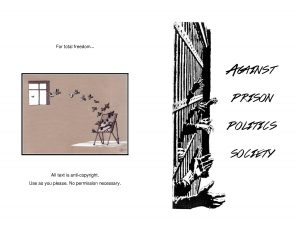
Text from the zine:
“There appears to be a trend in radical circles of distinguishing prisoners based on their so-called ‘crimes’, with the intent (conscious or not) to identify ‘political prisoners’ who, by virtue of their actions, are more deserving of support and solidarity. Prisoners who have been targeted by the state due to their political beliefs and/or actions are given special attention amongst radicals, while the rest of the prison population spending their days in a cage are often only an afterthought, used as a means to lend credibility to political ideology, or completely forgotten.
“This privileged and moralistic practice has invaded radical circles and creates a distinction between ‘political’ and ‘ordinary’ prisoner. Political prisoners are said to have been imprisoned unjustly, unlike the rest of the prison population. This can manifest either as an insistence of their innocence (as in the case of Mumia Abu-Jamal), or, in cases in which the prisoner has obviously broken the law, they are viewed as acting only in response to unjust laws or conditions (as in the case of Walter Bond). In both cases, their innocence is maintained.”